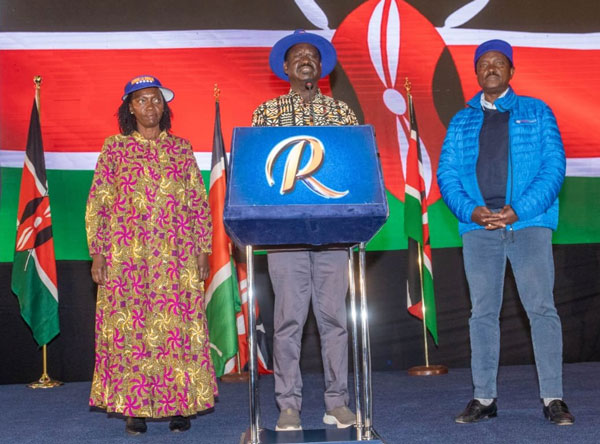
“Coalition, nusu mkate, handshake and bipartisan mean the same thing and I am comfortable with it as far as there is peace bora amani (so long as there is peace)”
Nairobi, Kenya | THE STAR KENYA | President William Ruto and Azimio leader Raila Odinga troops have welcomed the Sunday truce in which the President proposed a bipartisan approach to IEBC reconstitution and Opposition calling off nationwide protests.
The Kenya Kwanza leadership said a handshake was out of the question and so were virtually all of Raila’s demands: They will be limited to reconstitution of the Independent Electoral and Boundaries Commission, and the election result and servers were not on the table.
Nevertheless, leaders on Monday termed the events of Sunday a show of statesmanship and a template for political tolerance for the country and the region.
This follows their Sunday truce, where the two protagonists climbed down from their earlier hard line positions, ending the vitriol that had threatened to paralyse the country.
On March 9, 2018, former President Uhuru Kenyatta and Raila emerged from a closed-door meeting at Harambee House and shook hands before the cameras to end the post-election stalemate.
On Sunday, the two addressed separate press conferences hours apart.
UDA secretary general Cleophas Malala on Monday welcomed the ceasefire, terming it a win for the country that had been subjected to two weeks of disruptive and violent protests.
The former Kakamega senator said the move by President Ruto and Raila is a gesture of “heroism that had heralded a new dawn of inclusivity and national unity”.
“We want to thank him (Raila) because we have seen the aftermath of demos. If you start doing the postmortem, who will pay for the damages, the deaths and the injuries? … Only to end up with a process that should have been done at the initial stages,” Malala said.
The same was echoed by Makueni Senator Dan Maanzo, who said it was a huge win for Kenya and a timely intervention to cool down the political temperatures.
Ruto’s decision to reach out to Raila, the senator noted, would give the necessary impetus to unite communities after contested presidential election.
“That is a big achievement and we believe they will discuss the modalities of lowering the cost of living. We also want proper agreement on free and fair elections, that is the most important,” Maanzo said on the phone.
Religious leaders, who played a critical role in calling Ruto and Raila to the negotiating table to end the stalemate, also praised the truce.
Supreme Council of Kenya National Chairman Hassan ole Naado praised Raila and Ruto for breaking the deadlock, adding the cessation of hostilities symbolised by the truce would help heal old wounds and set the nation on the path of development.
Naado, however, cautioned hardliners not to antagonise the two leaders and their good good intentions but to give them space for candid talks for the sake of the country.
“Supkem is calling upon close associates of these two leaders to give them space to discuss the contentious issues frankly without interference for the sake of the betterment of the citizens of this great nation,” Naado said in a statement to newsrooms.
“We should not allow personal interest to jeopardise the greater good of all. We are watching. In this case, there is no winner or loser but Kenya gained.”
Even as Supkem made the pleas for tolerance, Nandi Senator Samson Cherargei launched an onslaught on the Azimio legislators telling them not to confuse the Sunday’s events with a handshake.
“I have seen my colleagues from the opposition excited that they want to come to government. Which government are they going to do? They should refocus on their role as opposition.”
“We know the bad effects of the handshake, which we don’t want to go back to. Kenyans are intelligent enough to know that we need a government and an opposition,” Cherargei said.
Ruto men had in the past months accused Raila of using street protests to force a handshake and get a slice of government through the backdoor.
The Nandi senator, however, applauded the two leaders for putting aside their extreme positions for the sake of Kenyans and the country.
Jubilee secretary general Jeremiah Kioni said Azimio’s immediate concerns were when the talks begin and the inclusion of lowering food prices to make life bearable for millions of Kenyans.
The former Ndaragwa MP insisted the Kenya Kwanza administration must reconsider its position on subsidies as an immediate strategy to cushion poor Kenyans.
“The immediate is the cost of living. The government has the ability to introduce subsidy on fuel and electricity. It has the ripple effect of lowering the cost of other goods, the same as electricity. We want the elderly given their social support stipends and children put in school. These don’t need a debate,” Kioni said.
“Then we will move at electoral justice and look at the economic reforms.”
EALA legislator David Sankok termed the ceasefire as an act of selflessness on the part of Ruto and Raila.
“Coalition, nusu mkate, handshake and bipartisan mean the same thing and I am comfortable with it as far as there is peace bora amani (so long as there is peace),” Sanko told the Star.
(Edited by V. Graham)
****
 The Independent Uganda: You get the Truth we Pay the Price
The Independent Uganda: You get the Truth we Pay the Price





